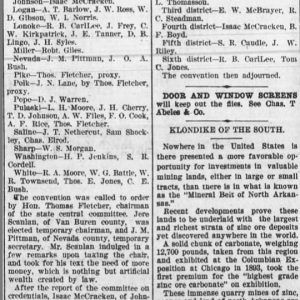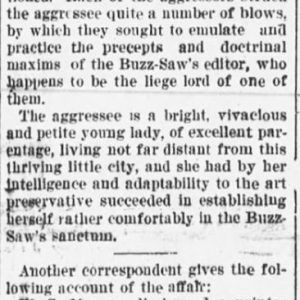calsfoundation@cals.org
Winfield Scott Morgan (1851–1928)
Winfield Scott Morgan (better known as W. Scott Morgan) lived in Arkansas for most of his life. As a writer, editor, lecturer, and political activist, he played an important role in farmers’ organizations and third-party politics at the state and national levels. Even after those organizations and parties disintegrated, Morgan maintained true to his reformist ideals, as evidenced by his published writings well into the twentieth century.
Born on August 25, 1851, in Columbus, Ohio, W. Scott Morgan moved with his family to Chillicothe, Missouri, when he was fourteen. Four years later, he married Retta Gilliland, with whom he would have five children. Morgan initially supported his family by teaching school for an annual salary of $200. He also began studying law, and, by 1882, he had passed the Missouri state bar examination and moved his family to West Plains, Missouri, where he planned to begin practicing law. Those plans never materialized, though, because after meeting an official of the U.S. Land Office, Morgan purchased 10,000 acres of timberland in Arkansas, most of it in Sharp County, and began furnishing ties for the construction of the Kansas City, Fort Scott, and Memphis Railroad.
In 1885, Morgan and his family began residing in the small Sharp County town of Hardy, where he added farming to his business activities and, in 1886, joined the Agricultural Wheel, an organization of mostly hard-pressed farmers that had originated in Prairie County four years earlier. Morgan served as a delegate to the Arkansas State Wheel meeting in 1887 and played a prominent role at the National Wheel convention in Meridian, Mississippi, the following year. In 1889, he published the first edition of History of the Wheel and Alliance, and the Impending Revolution, a lengthy tome that would be chosen as the official history of the Farmers’ Alliance, a similar organization with which the Agricultural Wheel would merge by 1891.
As Morgan became an important figure in the Agricultural Wheel, he assumed a similar role in the third-party movement—a movement with which the organization was closely associated. Morgan had already been a supporter of the Greenback Party before he settled in Arkansas, and in the late 1880s, he became involved with the short-lived (but significant) Union Labor Party, becoming state party chairman by 1890. He subsequently played an important role in the creation of the People’s (or Populist) Party, serving as the secretary of the Cincinnati, Ohio, convention in May 1891 that laid the structural foundation for that party. He also contributed significantly to the Populist movement through his newspaper, the National Reformer (later called Morgan’s Buzzsaw), and as editor of the National Reform Press Association, which provided ready print or copy for Populist newspapers across the nation.
In 1896, Morgan served as an Arkansas delegate to the national Populist convention in St. Louis, Missouri, where he unsuccessfully opposed the party’s nomination of Democratic presidential nominee William Jennings Bryan. Morgan turned down the Populists’ gubernatorial nomination in 1896, but he accepted it two years later. Morgan understood that he had no chance of winning the election (he would receive only about 7.5 percent of the vote), but he engaged in debates throughout the state with the Democratic and Republican nominees, attempting to educate voters on what he saw as the evils of those parties (especially the former) and the virtues of Populist doctrine.
Morgan tried in vain to keep the Populist Party alive in Arkansas into the twentieth century, but by then the state party was just as moribund as its national counterpart. In 1904, Morgan published a book titled The Red Light: A Story of Southern Politics and Election Methods, thinly veiled as fiction, in which he recounted the dishonest and gruesome tactics by which Arkansas Democrats defeated Agricultural Wheel and Union Labor candidates in 1888. By this point, Morgan—along with a minority of other Arkansas Populists—began to support the Socialist Party, and he contributed regularly to the St. Louis National Rip-Saw, a Socialist periodical, from 1911 to 1918.
Morgan died on August 27, 1928, at the home of his son near Hardy.
For additional information:
Goodwyn, Lawrence. Democratic Promise: The Populist Moment in America. New York: Oxford University Press, 1976.
Morgan, W. Scott. History of the Wheel and Alliance, and the Impending Revolution. New York: Burt Franklin, 1968. First edition online at http://archive.org/details/historywheeland00morggoog (accessed February 28, 2025).
Wheeler, John M. “The People’s Party in Arkansas, 1891–1896.” PhD diss., Tulane University, 1975.
Williams, Nancy A., and Jeannie M. Whayne, eds. Arkansas Biography: A Collection of Notable Lives. Fayetteville: University of Arkansas Press, 2000.
Matthew Hild
Georgia Institute of Technology
 Post-Reconstruction through the Gilded Age, 1875 through 1900
Post-Reconstruction through the Gilded Age, 1875 through 1900 Morgan Nominated
Morgan Nominated  Whipping Article
Whipping Article 



Comments
No comments on this entry yet.